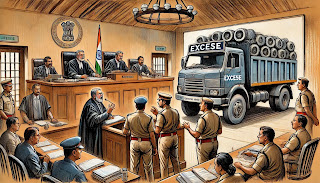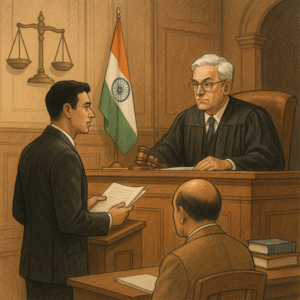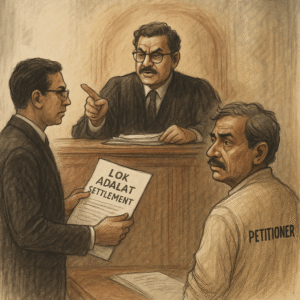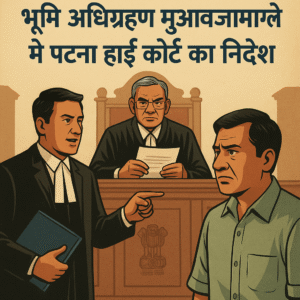Introduction
A recent case heard by the Patna High Court, CWJC No. 3687 of 2022, revolved around the confiscation of a truck allegedly involved in transporting illicit liquor. The petitioner, Mohammad Basim Akram, challenged the confiscation and the subsequent financial penalty imposed by the state authorities. The case highlights the legal complexities surrounding vehicle seizures under Bihar’s strict prohibition laws.
Background of the Case
The petitioner, Mohammad Basim Akram, is the registered owner of a truck that was seized by law enforcement authorities in Bihar. The police claimed that during a routine vehicle check, they discovered 8.8 liters of country-made liquor inside the driver’s cabin. This led to the immediate seizure of both the truck and the illicit liquor, as well as the arrest of the truck driver, Subodh Mandal.
Additionally, the police found 217 cartons containing disposable syringes with needles inside the truck. However, the authorities primarily focused on the liquor as grounds for confiscation.
Petitioner’s Defense
- The petitioner argued that he had no knowledge of the liquor in his truck.
- The driver admitted that the liquor was for his personal consumption.
- Since the liquor was found only in the driver’s cabin, the truck itself was not used for transporting illicit liquor on a commercial scale.
Legal Proceedings
Confiscation Order and Appeals
The Excise Superintendent recommended the confiscation of the vehicle, leading to the initiation of Confiscation (Excise) Case No. 340 of 2021 before the District Collector of Gopalganj. The Collector passed an order on July 7, 2021, confirming the confiscation.
However, the petitioner contested that he was not given a fair chance to present his defense.
First Appeal
The petitioner filed an appeal (Excise Appeal No. 536 of 2021), and the appellate authority set aside the confiscation order, directing the District Collector to hear the case afresh.
Second Confiscation Order
Despite this, the Collector reaffirmed the confiscation on November 18, 2021, without fully considering the petitioner’s arguments.
Final Appeal and Partial Relief
The petitioner then approached the Revisional Authority (Additional Chief Secretary, Excise Department, Bihar, Patna), which issued a ruling on February 9, 2022. This ruling stated that:
- The truck could be released upon payment of 50% of its insured value as a non-refundable penalty.
- However, the legal proceedings against the petitioner would continue.
The petitioner challenged this order, arguing that the penalty amounted to double jeopardy, as the legal case against him was still ongoing.
High Court’s Decision
The case was finally brought before the Patna High Court, which examined whether the confiscation and penalty were justified.
Key Legal Issues Considered
-
Was the petitioner responsible for the presence of liquor in the truck?
- Since the liquor was found in the driver’s cabin and the driver admitted to buying it for personal use, there was no conclusive evidence that the truck owner was involved in illegal transportation.
-
Was due process followed in confiscating the vehicle?
- The petitioner claimed he was not properly notified before the confiscation order was passed.
- The Excise Act requires authorities to serve a notice to the owner before confiscation.
-
Was the financial penalty imposed legally?
- The High Court noted that the rule allowing release on payment of a fine (Rule 12A of the Bihar Prohibition and Excise Rules, 2021) was introduced on April 5, 2022.
- However, the Revisional Authority ordered a penalty on February 9, 2022, before this rule was in effect.
- Therefore, the penalty was deemed invalid.
Final Verdict
The High Court ruled in favor of the petitioner, setting aside the confiscation order and penalty. The case was sent back to the District Collector, Gopalganj, for a fresh decision after giving the petitioner a fair hearing.
The court also clarified that the petitioner had the option to apply for vehicle release under the amended rules, which allowed release upon payment of a penalty.
Conclusion
This case highlights several crucial legal principles, including:
- The importance of due process in confiscation cases.
- Protection against double jeopardy, ensuring that a person isn’t punished twice for the same offense.
- The necessity of fair hearings before imposing penalties.
For truck owners and drivers operating in Bihar, this ruling reinforces that ownership alone does not imply guilt. If a vehicle is confiscated under the Excise Act, the owner must be given a fair chance to prove their innocence before facing severe financial penalties.
Final Takeaway: Legal battles over vehicle confiscation require careful scrutiny of the law. The Patna High Court’s decision ensures fairness and prevents unjust penalties, setting a precedent for future cases under Bihar’s prohibition laws.
Read
the full judgement Below;
https://patnahighcourt.gov.in/viewjudgment/MTUjMzY4NyMyMDIyIzEjTg==-HnN–ak1–6U8bS4A=







